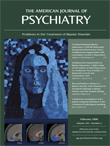To the Editor:
We agree with Dr. Goldney that in bipolar disorder there is an increased risk of suicidal behavior (1). We investigated only whether there is a greater risk of suicide in the placebo arms of placebo-controlled studies than in the active arms, and we found no difference between the two conditions.
Dr. Goldney would like us to clarify the meaning of “appropriate precautions” and asks whether this implies the exclusion of those who are suicidal. Indeed, in most studies, suicidal patients are explicitly excluded. However, this is not the meaning of “appropriate precautions.” By “appropriate precautions,” we mean the usual precautions that are taken before and/or during the studies (the inclusion and exclusion criteria, careful monitoring, etc.). When these appropriate precautions are taken, we have shown that concern about the risk of suicidal behavior is not an argument against the conduct of placebo-controlled trials for these indications. This conclusion is evidenced based and therefore credible, logical, and, indeed, ethical.
1. Tondo L, Isacsson G, Baldessarini RJ: Suicidal behaviour in bipolar disorder: risk and prevention. CNS Drugs 2003; 17:491–511Crossref, Medline, Google Scholar



